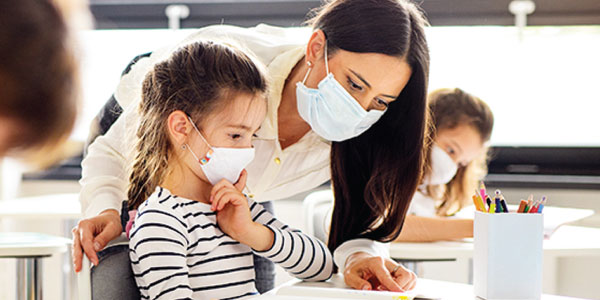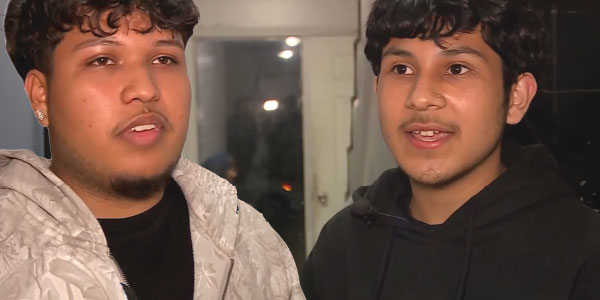
By Chara
Returning to in-class instruction has not been easy for many Kansas City area teachers, staff members and students.
“Unfortunately, this year has been quite the opposite from (the) last,” said an area teacher, who requested anonymity. “For myself, a teacher who taught in person during a pandemic, I find this year more mentally and emotionally exhausting.”
One of the biggest challenges the teacher faces is keeping up with the rhythm.
“As a teacher, I want to give my all because I feel my students deserve the best,” she said. “Unfortunately, though, this mindset causes a quick burnout in teachers. I constantly have to remind myself to find more balance in my life and to stop bringing work home.”
Students also are facing multiple challenges now that they are back in class, including academic challenges and social-emotional challenges, the teacher said.
“More than ever, students seem to be on high alert and seeking connection,” she said. “Simple rules and procedures that occur in the classroom and far beyond the pandemic are now being questioned by students and even denied. Rules such as using school-appropriate sites can cause an outburst in students, because when working virtually, this was either not applicable or the action was occurring out of the teacher›s control.”
The teacher said she is trying to prioritize her students’ social and emotional needs by addressing the behaviors she sees daily.
“I try my best at teaching students social-emotional skills they are missing or need more practice with (impulse control, empathy, regulations and so on),” she said. “When mistakes (occur) or frustration arises in the classroom, I use it as an opportunity to address the student(s)’ actions, discuss their feelings and problem-solve how they can fix them (for both minor and major issues), rather than scolding a student and/or punishing them.”
“In addition, I am also a big believer in building a class community that works together and helps one another out,” the teacher added. “When issues arise, we take time to meet as a class to address their concerns and together solve and/or create action steps.”
This process takes time to produce results, the teacher said. However, she keeps working and is consistent until she starts seeing changes, she said.
Another step the teacher has taken toward working with her students involves building relationships with them, she said.
“I have noticed that, when students see their teacher putting (in) an effort to listen to their struggles and in a nonjudgmental way, they are more willing to put in more effort, too,” the teacher said.
As a request to parents, the teacher encourages them to create a partnership with their children’s teachers to help battle the pandemic’s effects. She also advises parents to monitor and check their children’s technology usage, and communicate regularly with teachers or other adults who work with them.
Maestros del área se sienten abrumados este año escolar, afirma una educadora
Regresar a clases presenciales no ha sido fácil para muchos maestros, miembros del personal y estudiantes del área de Kansas City.
“Desafortunadamente, este año ha sido todo lo contrario al anterior”, dijo una maestra del área, quien solicitó el anonimato. “Para mí, una maestra que enseñó en persona durante una pandemia, encuentro este año más agotador mental y emocionalmente”.
Uno de los mayores desafíos que enfrenta el maestro es mantener el ritmo.
“Como maestra, quiero darlo todo porque siento que mis alumnos merecen lo mejor”, dijo. “Sin embargo, desafortunadamente, esta forma de pensar provoca un agotamiento rápido en los maestros. Constantemente tengo que recordarme a mí misma que debo encontrar más equilibrio en mi vida y dejar de traer trabajo a casa”.
Los estudiantes también enfrentan múltiples desafíos ahora que están de regreso en clase, incluidos desafíos académicos y desafíos socio-emocionales, dijo la maestra.
“Más que nunca, los estudiantes parecen estar en alerta máxima y buscando una conexión”, dijo. “Las reglas y procedimientos simples que ocurren en el aula y mucho más allá de la pandemia ahora están siendo cuestionados por los estudiantes e incluso negados. Las reglas como el uso de sitios apropiados para la escuela pueden causar un arrebato en los estudiantes, porque cuando se trabaja de manera virtual, esto no es aplicable o la acción ocurre fuera del control del maestro”.
La maestra dijo que está tratando de priorizar las necesidades sociales y emocionales de sus estudiantes al abordar los comportamientos que ve a diario.
“Hago todo lo posible para enseñar a los estudiantes las habilidades socio-emocionales que les faltan o con las que necesitan más práctica (control de impulsos, empatía, regulaciones, etc.)”, dijo. “Cuando (ocurren) errores o surgen frustraciones en el aula, lo utilizo como una oportunidad para abordar las acciones de los estudiantes, discutir sus sentimientos y cómo pueden solucionar sus problemas (tanto problemas menores como mayores), en lugar de regañar a un estudiante y/o castigarlo”.
“Además, también soy un gran creyente en la construcción de una comunidad de clase que trabaje en conjunto y se ayuden unos a otros”, agregó la maestra. “Cuando surgen problemas, nos tomamos el tiempo para reunirnos como clase para abordar sus inquietudes y juntos resolver y/o crear pasos de acción”.
Este proceso lleva tiempo para producir resultados, dijo la maestra. Sin embargo, ella sigue trabajando y es constante hasta que comienza a ver cambios.
Otro paso que la maestra ha dado para trabajar con sus alumnos implica establecer relaciones con ellos, dijo.
“Me he dado cuenta de que, cuando los estudiantes ven a sus maestros esforzándose por escuchar sus luchas y sin juzgarlos, también están más dispuestos a esforzarse más”, dijo la maestra.
Como solicitud a los padres, la maestra los alienta a crear una asociación con los maestros de sus hijos para ayudar a combatir los efectos de la pandemia. También aconseja a los padres que controlen y verifiquen el uso de la tecnología por parte de sus hijos y que se comuniquen con regularidad con los maestros u otros adultos que trabajen con ellos.









